初中英语重要短语的用法及区别(好) 32
初中英语重要短语、惯用法(36组、按字母顺序)
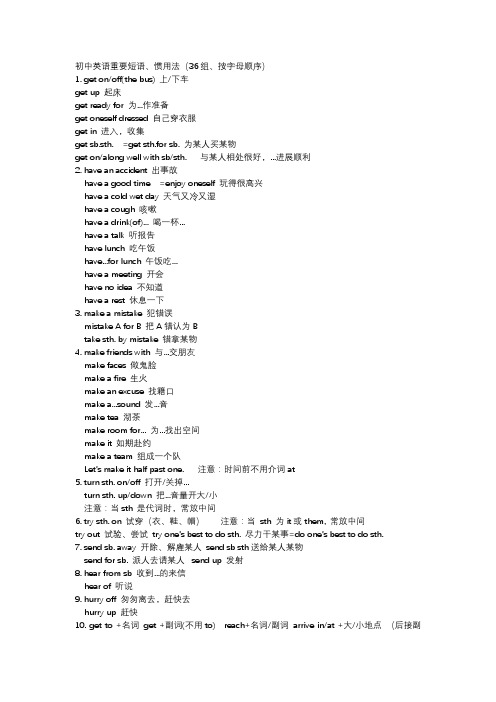
初中英语重要短语、惯用法(36组、按字母顺序)1. get on/off(the bus) 上/下车get up 起床get ready for 为...作准备get oneself dressed 自己穿衣服get in 进入,收集get sb.sth. =get sth.for sb. 为某人买某物get on/along well with sb/sth. 与某人相处很好,...进展顺利2. have an accident 出事故have a good time =enjoy oneself 玩得很高兴have a cold wet day 天气又冷又湿have a cough 咳嗽have a drink(of)... 喝一杯...have a talk 听报告have lunch 吃午饭have...for lunch 午饭吃...have a meeting 开会have no idea 不知道have a rest 休息一下3. make a mistake 犯错误mistake A for B 把A错认为Btake sth. by mistake 错拿某物4. make friends with 与...交朋友make faces 做鬼脸make a fire 生火make an excuse 找籍口make a...sound 发...音make tea 沏茶make room for... 为...找出空间make it 如期赴约make a team 组成一个队Let’s make it half past one.注意:时间前不用介词at5. turn sth. on/off 打开/关掉...turn sth. up/down 把...音量开大/小注意:当sth 是代词时,常放中间6. try sth. on 试穿(衣、鞋、帽)注意:当sth 为it或them, 常放中间try out 试验、尝试try one’s best to do sth. 尽力干某事=do one’s best to do sth.7. send sb. away 开除、解雇某人send sb sth送给某人某物send for sb. 派人去请某人 send up 发射8. hear from sb 收到...的来信hear of 听说9. hurry off 匆匆离去,赶快去hurry up 赶快10. get to +名词get +副词(不用to) reach+名词/副词arrive in/at +大/小地点(后接副词,不用at/in) eg. get to Shanghai、reach Shanghai 、arrive in Shanghai到达上海eg. reach home、get home、arrive home 到家11. teach sb. English 教某人英语teach oneself=learn sth.by oneself 自学12.到...末为止by the end of +过去时间(用于过去完成时)by the end of +将来时间(用于一般将来时)at the end of+地点在...尽头in the end= at last 最后,终于13. hundreds of 成百上千five hundredthousands of 成千上万的six thousandmillions of 成百万的 seven million14. be pleased to do sth 很高兴地干某事be pleased with sth. 为某事而高兴15. be used for 被用来used to do sth过去做----be used as 被当作be used to doing sth 习惯于做谋事be used by 被...所使用 be used to do sth 被用来做谋事16. so far 到目前为止,in the past/last few years 用于现在完成时17. on a Tuesday morning 一个星期二的早上on the morning of June 15th.1998 在1998年6月15日早上18. keep sb.doing sth. 让某人一直干某事keep doing sth. 继续做某事keep on doing sth. 持续不断地做某事19. much too+形容词/副词原级实在太...too much+不可数名词相当多的...eg. It’s _______ expensive. I can’t buy it. There’s ___________ rain this year.20. thanks to...由于,多亏thanks to one’s help=because of one’s help 由于某人的帮忙thanks for one’s help 谢谢某人的帮助21. be far away from+a place/sb 远离某地22. because of + n.eg Because of the rain, we can’t go out.类似还有instead of sb/sth23. two-month holiday=two months’ holiday 二个月的假期 an eight—year—old child 一个八岁的孩子24. fall asleep 入睡(进入状态)get to sleep 入睡(还没睡着)25. stop sb.from doing sth. 阻止某人干某事eg. She stopped the child from listening.stop doing sth. 停止干某事,不再干某事stop to do sth. 停止下来干另一件事。
初中英语中考常用词汇词组短语用法区分(共24组)
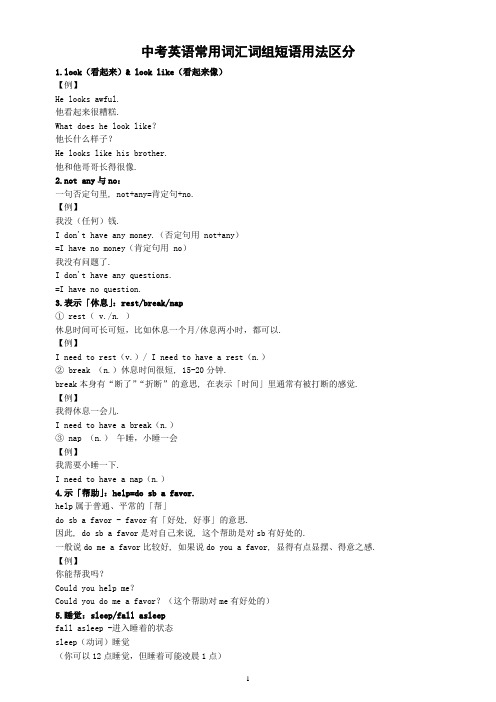
中考英语常用词汇词组短语用法区分1.look(看起来)& look like(看起来像)【例】He looks awful.他看起来很糟糕.What does he look like?他长什么样子?He looks like his brother.他和他哥哥长得很像.2.not any与no:一句否定句里, not+any=肯定句+no.【例】我没(任何)钱.I don't have any money.(否定句用 not+any)=I have no money(肯定句用 no)我没有问题了.I don't have any questions.=I have no question.3.表示「休息」:rest/break/nap① rest( v./n. )休息时间可长可短,比如休息一个月/休息两小时,都可以.【例】I need to rest(v.)/ I need to have a rest(n.)② break (n.)休息时间很短, 15-20分钟.break本身有“断了”“折断”的意思, 在表示「时间」里通常有被打断的感觉. 【例】我得休息一会儿.I need to have a break(n.)③ nap (n.)午睡,小睡一会【例】我需要小睡一下.I need to have a nap(n.)4.示「帮助」:help=do sb a favor.help属于普通、平常的「帮」do sb a favor - favor有「好处, 好事」的意思.因此, do sb a favor是对自己来说, 这个帮助是对sb有好处的.一般说do me a favor比较好, 如果说do you a favor, 显得有点显摆、得意之感. 【例】你能帮我吗?Could you help me?Could you do me a favor?(这个帮助对me有好处的)5.睡觉:sleep/fall asleepfall asleep -进入睡着的状态sleep(动词)睡觉(你可以12点睡觉,但睡着可能凌晨1点)【例】我昨晚12点就睡了, 但1点才睡着.I went to sleep at 12 last night, but I fell asleep at 1.6.in time及时/on time准时比如:约7点见面.in time及时, 指在7点之内就到了, 可能还不到7点就到了.on time准时/按时, on是在...上面, 如果正好在7点上, 等于正好7点准时到.7.征求... ask for....ask sb for permission向某某请求同意ask for sb's permission请求某某的同意2种都可以用8.洗澡:shower/bathtake a shower(淋浴 ,花洒的洗澡)have a bath(泡澡 ,带浴缸的)bath tub浴缸9.工作:job/workjob-工作的名词,找了一份/两份工作work-工作的内容【例】我找到了2份工作.I found two jobs.我的工作没做完.I didn't finish my work.10.想要/需要:want/needwant和need的用法相同, 后面都可以:+to do+sb to do+n.(名词)+to+be+形容词(a.)【例】我需要你的帮助.+n.(名词)I need/want your help.(help在这里是名词)我想要洗澡I need a shower.(+名词)I need to take a shower(+to do)我需要你帮我.+sb to doI need/want you to help me.(help在这里是动词)我想让你开心I want you to be happy.(+形容词)-happy是形容词,前面加be,to后面要加动词,be是系动词,也属于动词的一种综上,有动词+do没有动词:用名词/形容词/介词短语/副词/done,且这些词前面一定要+be动词11.表示「担心」:worried(a.)-状态worry(v.)-动作【例】我不想让你担心.I don't want you to be worried.-句中没有动词,worried是形容词, 前面要加be(只要没有动词,就要+be动词)我真的很担心你.I really worry about you.(worry-动词)12.想要/需要:need/have to口语中都可以表示“得.../不得不.../不用.../不需要.../不必...”我得把作业做了I need/have to finish my homework.(+to do)你得休息了.You need a rest.(+n.)You need/have to rest.(+to do)你不用/不必关心我.You don't have to care about me.13.want/be going to do① want想(要),表示意愿和欲望,都是脑子里的想法,实际上会不会去做未知② be going to do要,准备,打算,表示主语/说话人的计划,基本上要实施(实际生活中,要结合实际情景运用)14.最好...had better (not) do sth.【例】你最好去看医生.You had better go to see a doctor.(也可略写成 You’d better...)15.有...要....have sth to do【例】我有很多作业要做.I have a lot of homework to do.我没钱看电影.I don't have money to watch movie.16.already(已经)&yet(还)① already&yet都是副词(adv.), 在现在完成时中, 可加可不加.-如果加上, 有点儿”锦上添花“的意思.-如果不加, 对「现在完成时强调动作已完成」也不影响.「现在完成时」回顾 :【笔记】0基础入门英语语法 | 时态:现在完成时&一般过去时, 怎么区分?【例】他已经写完作业了.He has finished homework.He has finished homework already.(两句话意思相同)② already用于肯定句, yet多用于否定句/疑问句.【例】他已经写完作业了.He has finished homework already.他还没写完作业.He hasn't finished homework yet.③如果不使用现在完成时(不强调动作已完成), 句中用already&yet, 则表示已经处于某种状态.【例】我已经在路上了.I'm already on the way.他还不是个老师.He is not a teacher yet.(事情还没发生)综上:-句中有动作, 且强调动作已完成, 用现在完成时, 表示「已经/还」, already/yet可加可不加.-句中没有动作, 不强调动作完成, 不用现在完成时, 只强调已经处于某种状态, 要加already/yet.17.表示「还...」:yet&still① yet用于否定句/疑问句, 通常翻译为:还没...② still用于肯定句, 通常翻译为:仍然.../还...【例】他们仍然(还)记得那天.They still remember that day.我还没回家.I'm not home yet.18.表示「再...」again & any more① again用于肯定句/否定句② any more用于否定句/疑问句, 通常翻译为:再也不.../不再....③ again表示「再一次...」,any more既可以表示「程度」,又可以表示「次数」【例】我再也不吃糖了.I will not eat candy again/any more.我再也不会输了.I won't lose again.(下一次不会再输)I won't lose any more.(不会输)非谓语动词做名词(宾语)I(主) like(谓) making friends(宾).I finish doing my homework.(关于「非谓语动词」, 咱后边还会专门讲, 敬请关注~)19.表示「擅长...」be good at doing sth- good是形容词, be good是「系表」结构, 如果前面加上主语, 则结构完整, 后面可以加adv./介词短语.- at是介词, 后面不可能再用动词, 所以doing是把动词加上ing变成名词, 在这里与前面的介词共同构成介词短语.- 用法延伸:be good表示「XXX很好」, good也可以替换成其它表示”好“的形容词:great/fantastic...↓be good/great/fantastic...+at doing sth.20.使动词用法&make两者都有“让某人....”的意思, 区别在于:① make后面只能加使动词的形容词(a.)形式, 构成「主谓宾+宾补」的结构②使动词本身就有“让某人....”的意思综上:make sb +a.(主谓宾宾补)让...disappoint(使动词) sb让...失望=make sb disappointed(a.)=let sb down【例】我不想让你失望.I don't want to disappoint you.I don't want to make you disaapointed.I don't want to let you down.「使动词」相关知识点回顾 :【笔记】英语语法入门到精通(19)| 动词之:使动词(用法&归纳)21.表示「选择」:choice (n.), 复数形式:choiceschoose (v.)【例】菜单上有很多选择, 但我的选择是汉堡 .The menu had a lot of options, but my choice was the burger.我必须在今晚去健身房还是去看电影之间做选择.I have to choose between going to the gym or watching a movie tonight.22.表示「听到/听说」hear(vt)听到, 直接加人/物,都是可以发出声音的hear(vi) +介词of/about-听说【例】我能听到窗外的鸟叫.I can hear(vt.) the birds chirping outside my window.-hear后面直接跟鸟bird, 是可以发声的.我以前从未听说过那个餐厅.I've never heard of that restaurant before.你听说过市中心刚刚开业的新店吗?Have you heard about the new store that just opened downtown?-hear是不及物动词(vi),后面必须加介词, 表示“听说...”23.pick sb up捡起来, 接某人【例】我的朋友下班后要来接我.My friend is going to pick me up after work.24.表示「同意」① agree to 暗示了决定做某事的意愿是由别人提出或请求的, 有被迫同意的意味② agree with 同意某人的观点,它意味着一个人的观点与另一个人的观点是一致的③ agree on 意为与别人达成协议或共同决定。
初中英语知识点归纳形容词短语的用法

初中英语知识点归纳形容词短语的用法形容词短语在英语中扮演着非常重要的角色,它能够丰富句子,使其更加生动、准确。
因此,掌握常见的形容词短语以及它们的使用方法对于学习英语来说至关重要。
本文将介绍初中英语中常见的形容词短语及其用法。
一、描述人的形容词短语1. 勇敢的:brave, courageous, fearless例如:- He is a brave firefighter.(他是一名勇敢的消防员。
)- The soldier showed great courage in the face of danger.(士兵在危险面前表现出了伟大的勇气。
)2. 友好的:friendly, amiable, sociable例如:- She is a friendly and approachable teacher.(她是一位友好又平易近人的老师。
)- John is known for his sociable personality.(约翰以他好交际的个性而闻名。
)3. 聪明的:intelligent, clever, smart例如:- Ann is an intelligent and hardworking student.(安是一名聪明又勤奋的学生。
)- The little boy is very clever for his age.(这个小男孩在他的年龄上非常聪明。
)4. 幸福的:happy, joyful, blissful例如:- He had a happy childhood.(他度过了一个幸福的童年。
)- The couple looked blissful on their wedding day.(这对夫妇在他们的婚礼日看起来幸福满溢。
)5. 悲伤的:sad, sorrowful, melancholy例如:- She felt sad when her pet dog passed away.(她的宠物狗去世时,她感到很伤心。
初中英语短语词组归纳
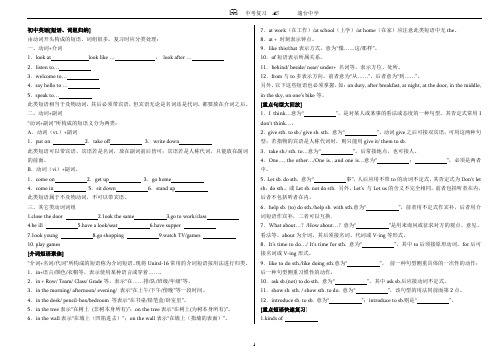
中考复习 ✍ 遄台中学1初中英语[短语、词组归纳]由动词开头构成的短语、词组很多。
复习时应分类处理: 一、动词+介词1.look at look like … , look after … 2.listen to… 3.welcome to… 4.say hello to … 5.speak to…此类短语相当于及物动词,其后必须带宾语,但宾语无论是名词还是代词,都要放在介词之后。
二、动词+副词“动词+副词”所构成的短语义分为两类: A .动词(vt.)+副词1.put on 2.take off 3.write down此类短语可以带宾语,宾语若是名词,放在副词前后皆可;宾语若是人称代词,只能放在副词的前面。
B .动词(vi )+副词。
1.come on 2.get up 3.go home 4.come in 5.sit down 6.stand up 此类短语属于不及物动词,不可以带宾语。
三、其它类动词词组1.close the door2.1ook the same3.go to work/class4.be ill5.have a look/seat6.have supper7.1ook young8.go shopping9.watch TV/games 10. play games [介词短语聚焦]“介词+名词/代词”所构成的短语称为介词短语。
现将Unitsl-16常用的介词短语按用法进行归类。
1.in+语言/颜色/衣帽等,表示使用某种语言或穿着……。
2.in + Row/ Team/ Class/ Grade 等,表示“在……排/队/班级/年级”等。
3.in the morning/ afternoon/ evening/ 表示“在上午/下午/傍晚”等一段时间。
4.in the desk/ pencil-box/bedroom 等表示“在书桌/铅笔盒/卧室里”。
5.in the tree 表示“在树上 (非树本身所有)”;on the tree 表示“在树上(为树本身所有)”。
初中英语最重要的50个固定短语
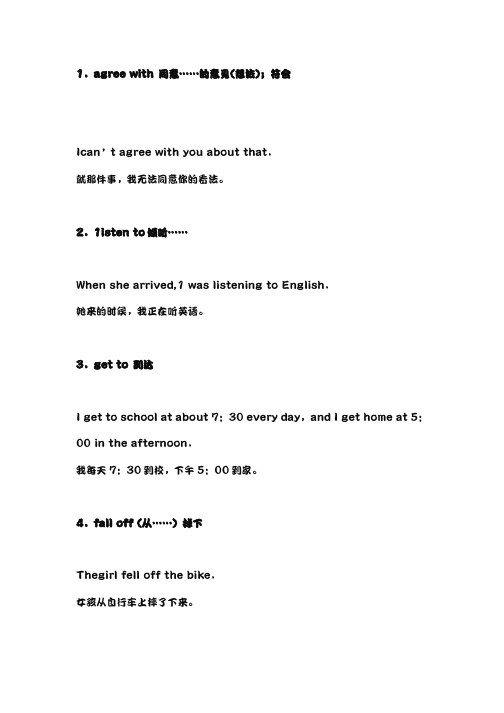
1.a g r e ew i t h同意……的意见(想法);符合I c a n’t a g r e ew i t hy o ua b o u t t h a t.就那件事,我无法同意你的看法。
2.1i s t e nt o倾听……W h e ns h ea r r i v e d,1w a sl i s t e n i n gt oE n g l i s h.她来的时候,我正在听英语。
3.g e t t o到达I g e t t os c h o o l a t a b o u t7:30e v e r yd a y,a n dI g e t h o mea t5:00i nt h ea f t e r n o o n.我每天7:30到校,下午5:00到家。
4.f a l l o f f(从……)掉下T h e g i r l f e l l o f f t h eb i k e.女孩从自行车上摔了下来。
5.k n o c ka t/o n敲(门、窗)T h e r ew a sah e a v yk n o c ka t t h ed o o r.有人在猛烈地敲门。
6.l a u g ha t嘲笑I t’sn o t g o o dt o1a u g ha t ap e r s o nw h oi si nt r o u b l e.讥笑一个陷于困境的人是不对的。
7.1e a r n…f r o m…向……学习B o b,y o us h o u l dl e a r nf r o m y o u rb r o t h e r.H ed o e sw e l l i nh i s h o me w o r k.鲍勃,你应该向你哥哥学一学。
他的作业完成得很好。
8.1i v eo n继续存在;靠……生活P e o p l ei nmyh o me t o w nl i v eo nr i c e.我家乡的人们靠大米为生。
初中英语重要短语用法及区别

初中英语重要短语用法及区别初中英语重要短语用法及区别我们在记忆单词的时候,面对易混淆的词语要注意分清。
下面是店铺整理的初中英语重要短语用法及区别,欢迎阅读!英语重要短语的用法及区别:find , look for,find out二者都有“寻找”的意思。
find是look for的结果。
What are you looking for ? 你在找什么?look for是find之前的寻找过程。
Have you found your pen ? 你找到你的钢笔了吗?Find out指经过一番努力最终找到。
I found out she was wrong.我发现她错了。
英语重要短语的用法及区别:whether,if这两个连词都作“是否”解,引导宾语从句时,两者通常可以互换。
但在下列几种情况下,不可用if 代替whether。
1)当whether 与or not连成词组时。
I don't know whether or not they will come for our help.我不知道他们是否来帮助我们。
2)whether 用在不定式前面时。
She hasn't decided whether to go or not.她还没有决定去还是不去。
3)whether引导的从句放在句首时。
Whether this is true or not,I can't say.这是不是真的,我不说(或我说不准)英语重要短语的用法及区别:date , daydate指"日期"。
What's the date today ? 今天几号?day指"星期几",指二十四小时的一整天;也单指白天;也指重要的日子.What day is today ? 今天星期几?There are seven days in a week . 一周有七天。
National Day 国庆节英语重要短语的用法及区别:join , take part in, join in二者都有“参加”的意思。
初中英语知识点归纳常见形容词短语的用法
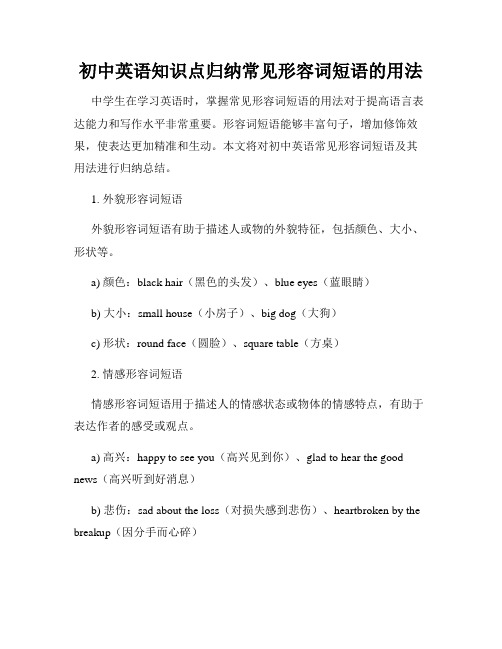
初中英语知识点归纳常见形容词短语的用法中学生在学习英语时,掌握常见形容词短语的用法对于提高语言表达能力和写作水平非常重要。
形容词短语能够丰富句子,增加修饰效果,使表达更加精准和生动。
本文将对初中英语常见形容词短语及其用法进行归纳总结。
1. 外貌形容词短语外貌形容词短语有助于描述人或物的外貌特征,包括颜色、大小、形状等。
a) 颜色:black hair(黑色的头发)、blue eyes(蓝眼睛)b) 大小:small house(小房子)、big dog(大狗)c) 形状:round face(圆脸)、square table(方桌)2. 情感形容词短语情感形容词短语用于描述人的情感状态或物体的情感特点,有助于表达作者的感受或观点。
a) 高兴:happy to see you(高兴见到你)、glad to hear the good news(高兴听到好消息)b) 悲伤:sad about the loss(对损失感到悲伤)、heartbroken by the breakup(因分手而心碎)c) 兴奋:excited about the upcoming trip(对即将到来的旅行感到兴奋)、thrilled to win the competition(激动地赢得比赛)3. 能力形容词短语能力形容词短语可以描述人的能力、技能或特长。
a) 聪明:intelligent student(聪明的学生)、smart in solving problems(善于解决问题)b) 有创造力:creative artist(有创造力的艺术家)、innovative ideas (创新的想法)c) 有组织能力:organized teacher(有组织能力的老师)、well-prepared presentation(准备充分的演讲)4. 特征形容词短语特征形容词短语可以描述人或物的特征或性格。
a) 友好:friendly neighbor(友好的邻居)、kind-hearted person(善良的人)b) 耐心:patient teacher(耐心的老师)、tolerant attitude(宽容的态度)c) 有幽默感:humorous friend(幽默的朋友)、funny jokes(有趣的笑话)5. 环境形容词短语环境形容词短语用于描述地方、氛围等环境情况。
初中常见短语用法

初中常见短语用法初中学习阶段,为了更好地掌握英语语言表达,学生们需要学习并正确运用各种短语。
短语在英语中起到了连接句子和丰富表达的作用,掌握常见短语的用法不仅可以提高学生的写作水平,还可以帮助他们更好地理解英语原文。
本文将介绍一些初中常见短语的用法,以帮助学生们更好地运用这些短语。
一、时间短语1. at the moment:此刻,现在例如:- Sorry, I can't talk right now. I'm really busy at the moment.(对不起,我现在很忙,不能聊天。
)- He's not here at the moment, but he'll be back soon.(他现在不在这里,但很快就回来。
)2. in the future:将来,在未来例如:- I want to travel around the world in the future.(我希望将来能环游世界。
)- We need to take action to protect the environment in the future.(我们需要采取行动保护环境。
)二、地点短语1. at the back of:在……后面例如:- Tom is sitting at the back of the classroom.(汤姆坐在教室的后面。
)- The bookstore is at the back of the street.(书店在这条街的后面。
)2. in front of:在……前面例如:- Our school is in front of the park.(我们学校在公园的前面。
)- The car stopped in front of the red light.(车子停在红绿灯前面。
)三、原因短语1. because of:因为例如:- She couldn't come to the party because of her illness.(她因为生病不能来参加派对。
